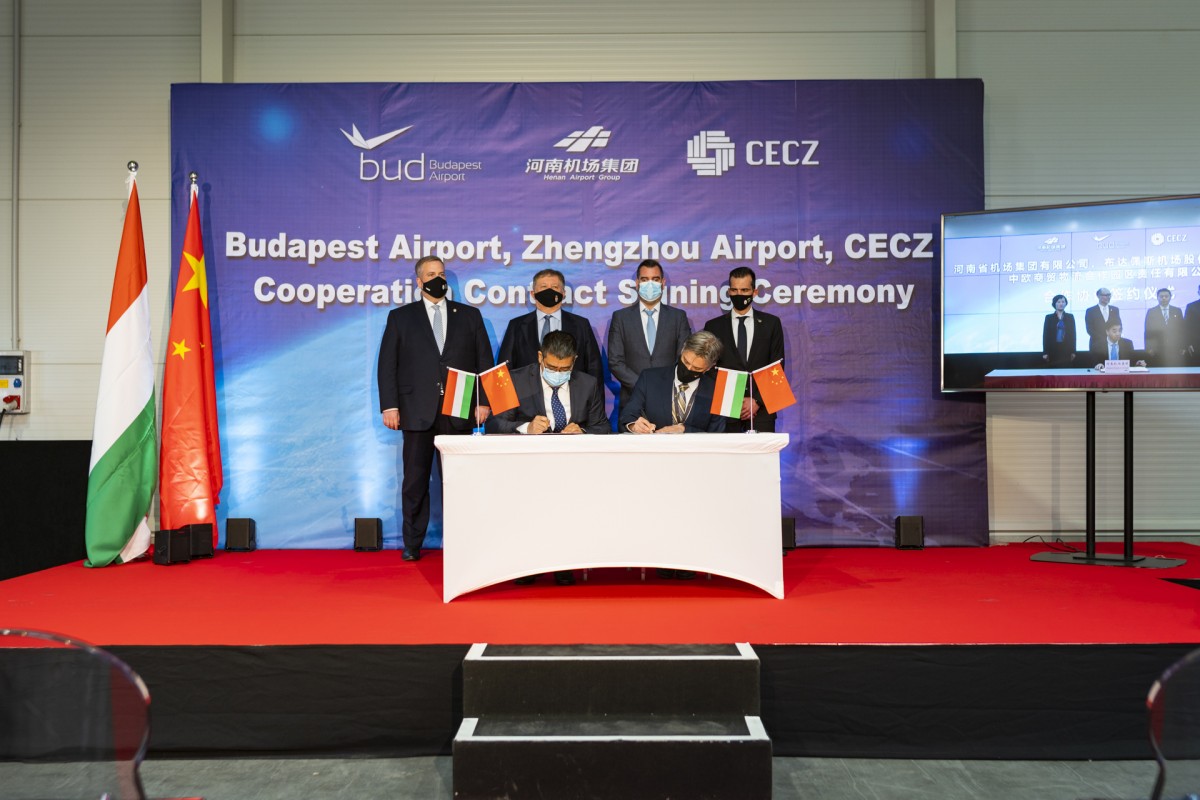
Chinese logistics base to be constructed at Budapest Airport
The newly signed cooperation agreement is expected to bring important economic opportunities and foster a significant expansion of air freight between Hungary and China, by connecting Budapest Airport (BUD) and Zhengzhou Airport (CGO)

Budapest Airport, the Chinese Henan Airport Group (the operator of Zhengzhou International Airport), and the Chinese-Hungarian business and logistics development company CECZ/Utlink signed a cooperation agreement, aimed at establishing the aerial Silk Road between Hungary and China and creating dedicated logistics centers at the two airports, to handle freight traffic, according to a media statement.
The newly signed cooperation agreement is expected to bring important economic opportunities and foster a significant expansion of air freight between Hungary and China, by connecting Budapest Airport (BUD) and Zhengzhou Airport (CGO), while also providing significant logistics advantages for Hungary, the ECE countries and China. Within the framework of the agreement, the partners – BUD, CGO and the logistics development company CECZ/Utlink Central European Trading and Logistic Cooperation Zone – jointly establish what the press release calls the “aerial Slik Road” between the two countries.
On the Hungarian side, the Ministry of Foreign Affairs and Trade, the Ministry for Innovation and Technology, the central and the Airport Directorate of the National Customs and Tax Administration, the Hungarian Investment Promotion Agency (HIPA) and Magyar Posta Zrt. (Hungarian Post) and Ghibli Kft. provided support for the project.
László Mosóczi, Minister of State for Transport Policy said, “According to the government’s plans, Hungary could become the cargo, logistics and distribution hub for Central Europe. This strategic objective can be achieved if the largest possible proportion of the goods transported between Europe and the Far East reach their destination via Hungary. In harmony with the policy of opening to the east, we are therefore continuing to work to connect continents and regions with modern and safe logistics solutions. We are also looking for ways to deepen and expand cooperation with our Chinese partners, in line with our joint goals.”
The project was already specified as an objective during the meeting between China and the East-Central European countries held in Beijing in February 2021, led by Chinese President Xi Jinping.
“I trust that the BUD Cargo City will be a perfect station for this 21st century aerial Silk Road, where a world-class logistics complex will serve the handling of air cargo. It is one of our top priorities to strengthen Hungary’s position within the East-Central European region,” emphasized Chris Dinsdale, CEO of Budapest Airport.
“We are thankful for our business, authority, and political partners who supported the aerial Silk Road project, and we believe that thanks to the Silk Road, excellent new opportunities will open in the economy, commerce and logistics between Hungary, East-Central Europe, and China,” he added.
As part of the cooperation, a direct CGO-BUD-CGO cargo flight was launched last October, organized by the CECZ/Utlink group, which was operated by Hainan Airlines three times a week. At the end of March 2021, the aerial connection was expanded with two more frequencies per week, flown with Boeing 747 aircraft. This route has now arrived at a new milestone, with the 100th flight operated, Budapest Airport notes.
Dedicated cargo handling warehouses have already been established at Budapest and Zhengzhou airports to handle traffic. The Budapest Exclusive Overseas Terminal at Henan Airport was handed over in February 2021, and the dedicated warehouse hall called the Zhengzhou Exclusive Overseas Terminal was handed over today in the Cargo City at Budapest Airport.
With its annual capacity of up to 180,000 tons, the BUD Cargo City provides an excellent infrastructural environment for the launch of the project, but the significantly increasing cargo volume warrants the establishment of another large, dedicated logistics center. The parties are currently conducting negotiations regarding the creation of a Chinese logistics hub of tens of thousands of square meters, to be constructed at Budapest Airport, which would provide an annual cargo handling capacity of several hundred thousand tons, contributing to the development of the connected air freight traffic.
The other key outcome of the agreement is that Cainiao, Alibaba’s logistics company, designated Budapest Airport as its East-Central European hub. The first deliveries commence in April. As a result of successful implementation, tens of tons of freight have already appeared at Budapest Airport per day, and much greater volumes are expected going forward, thanks to the regional hub role of the project.

